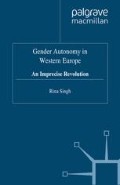Abstract
This study has taken the point of view that only autonomy is an adequate concept of equality for women and that the emphasis should be on monitoring the process towards the goal of autonomy because the end state of autonomy is elusive conceptually. Adequate equality takes into account the differences of women so as to enable them to make free lifestyle choices to participate in both or either the public and private spheres in a way that neither penalises nor rewards the choices in material and/or social terms. Such individualised equality means that not only are differences between men and women accounted for, but also that differences between women themselves are accounted for. As such, autonomy is an anarchic concept and eludes speculation as to what its ideal end state might look like. This study has examined, rather, the process towards gender autonomy, because focusing on the process reaffirms that gender autonomy, not equality, is the goal.
Access this chapter
Tax calculation will be finalised at checkout
Purchases are for personal use only
Preview
Unable to display preview. Download preview PDF.
Copyright information
© 1998 Rina Singh
About this chapter
Cite this chapter
Singh, R. (1998). Conclusions. In: Gender Autonomy in Western Europe. Palgrave Macmillan, London. https://doi.org/10.1057/9780230379022_7
Download citation
DOI: https://doi.org/10.1057/9780230379022_7
Publisher Name: Palgrave Macmillan, London
Print ISBN: 978-0-333-71350-1
Online ISBN: 978-0-230-37902-2
eBook Packages: Palgrave Social & Cultural Studies CollectionSocial Sciences (R0)

